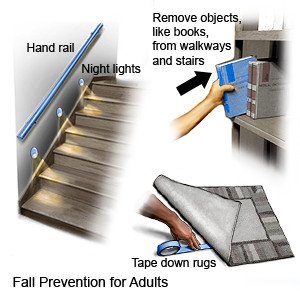Bone Metastasis
Medically reviewed by Drugs.com. Last updated on Jul 7, 2024.
AMBULATORY CARE:
Bone metastasis
is cancer that starts in one area and then spreads to a bone. Some examples are lung, breast, thyroid, prostate, and kidney cancers. Bone metastasis often happens in the spine, upper arm or leg bone, ribs, hips, or skull. Your risk for bone metastasis is higher if you have had cancer for a long time. Cancer that spreads to a bone can weaken the bone and increase your risk for fractures.
Common signs and symptoms of a bone metastasis:
- Bone pain that is worse at night
- Discomfort when you walk or sit, or trouble finding a comfortable position
- Fatigue or weakness
- Bone fractures
- Numb area, trouble moving a body part, or trouble urinating
- Weight loss without trying, or loss of appetite
- High levels of calcium in your blood
- Bleeding or bruising easily
- Back pain
Seek care immediately if:
- You break a bone.
- You have sudden sharp pain, or the pain spreads to other areas of your body.
- You have new or worsening pain that does not get better with medicine.
- You cannot move part of your body, or it is numb.
- You have loss of appetite, nausea, or severe thirst, or you are vomiting.
- You are urinating more than usual, or you feel tired, weak, confused, or sleepy.
- You have back or neck pain, constipation, and trouble urinating.
Call your doctor or oncologist if:
- You have muscle weakness, or you are unusually tired.
- You have new pain that seems to be coming from a bone.
- You have questions or concerns about your condition or care.
Treatment
will depend on the type of cancer that spread to a bone. The cancer cells will still look and act like the original cancer. It will respond to treatment for that type of cancer. For example, if you had breast cancer that spread to a bone, you will need treatment used for breast cancer. Treatment may shrink the tumor or slow its growth but may not make the cancer go away completely.
- Prescription pain medicine may be given. Ask your healthcare provider how to take this medicine safely. Some prescription pain medicines contain acetaminophen. Do not take other medicines that contain acetaminophen without talking to your healthcare provider. Too much acetaminophen may cause liver damage. Prescription pain medicine may cause constipation. Ask your healthcare provider how to prevent or treat constipation.
- NSAIDs , such as ibuprofen, help decrease swelling, pain, and fever. This medicine is available with or without a doctor's order. NSAIDs can cause stomach bleeding or kidney problems in certain people. If you take blood thinner medicine, always ask your healthcare provider if NSAIDs are safe for you. Always read the medicine label and follow directions.
- Medicine may be given to reduce bone pain. Medicines may also slow damage caused by the cancer, or prevent the cancer from causing the bone to fracture.
- Chemotherapy (chemo) is medicine used to kill cancer cells.
- Radiation uses high-energy rays to kill cancer cells or keep them from growing quickly.
- Inhibitor medicines may be given to help destroy the cancer cells. One medicine helps your immune system kill the cancer cells. Another medicine makes cancer cells die by preventing them from being repaired. This helps keep cancer from progressing as quickly.
- Targeted therapy is medicine used to kill cancer cells by destroying what is inside the cells. You may have targeted therapy along with chemo or radiation.
- Surgery may be needed to prevent fractures. Screws, plates, or other devices may be used to help make the bone more stable. Surgery may also be used to help a fractured bone heal correctly. Bone cement may be used along with other treatments to strengthen the bone.
Do not smoke:
Smoking increases your risk for new or returning cancer, and can cause bone loss. Smoking can also delay healing after treatment. Ask your healthcare provider for information if you currently smoke and need help quitting.
Limit or do not drink alcohol as directed:
Alcohol can decrease bone mineral density and weaken your bones. Limit alcohol to 2 drinks per day if you are a man. Limit alcohol to 1 drink per day if you are a woman. A drink of alcohol is 12 ounces of beer, 5 ounces of wine, or 1½ ounces of liquor.
Manage a bone metastasis:
- Prevent falls. Wear shoes that fit well and have soles that grip. Wear shoes both inside and outside. Remove objects from walkways and stairs so you do not trip on them. Place cords for telephones and lamps out of the way so that you do not need to walk over them. Remove small rugs or secure them with double-sided tape. Install bright lights in your home. Use night lights to help light paths to the bathroom or kitchen.

- Eat a variety of healthy foods. Healthy foods include fruits, vegetables, lean meats, beans, and low-fat dairy products. Your healthcare provider may recommend that you get more calcium and vitamin D. Calcium and vitamin D work together to build and protect bones. Good sources of calcium are dairy products, broccoli, tofu, almonds, and canned sardines. Vitamin D is in fish oils, some vegetables, and fortified milk, cereal, and bread. Vitamin D is also formed in the skin when it is exposed to the sun. Ask your healthcare provider how much sunlight is safe for you.


- Go to physical or occupational therapy as directed. A physical therapist can teach you safe exercises to strengthen your bones and muscles. Strong muscles can help protect bones. An occupational therapist can teach you how to do your daily activities safely.
- Keep a pain diary. Include where you feel the pain and if anything helped relieve it. Bring your pain diary to follow-up visits with your healthcare providers.
Follow up with your doctor or oncologist as directed:
You may need ongoing tests, bone scans, or treatment. Write down your questions so you remember to ask them during your visits.
© Copyright Merative 2024 Information is for End User's use only and may not be sold, redistributed or otherwise used for commercial purposes.
The above information is an educational aid only. It is not intended as medical advice for individual conditions or treatments. Talk to your doctor, nurse or pharmacist before following any medical regimen to see if it is safe and effective for you.
Learn more about Bone Metastasis
Treatment options
Care guides
Further information
Always consult your healthcare provider to ensure the information displayed on this page applies to your personal circumstances.
